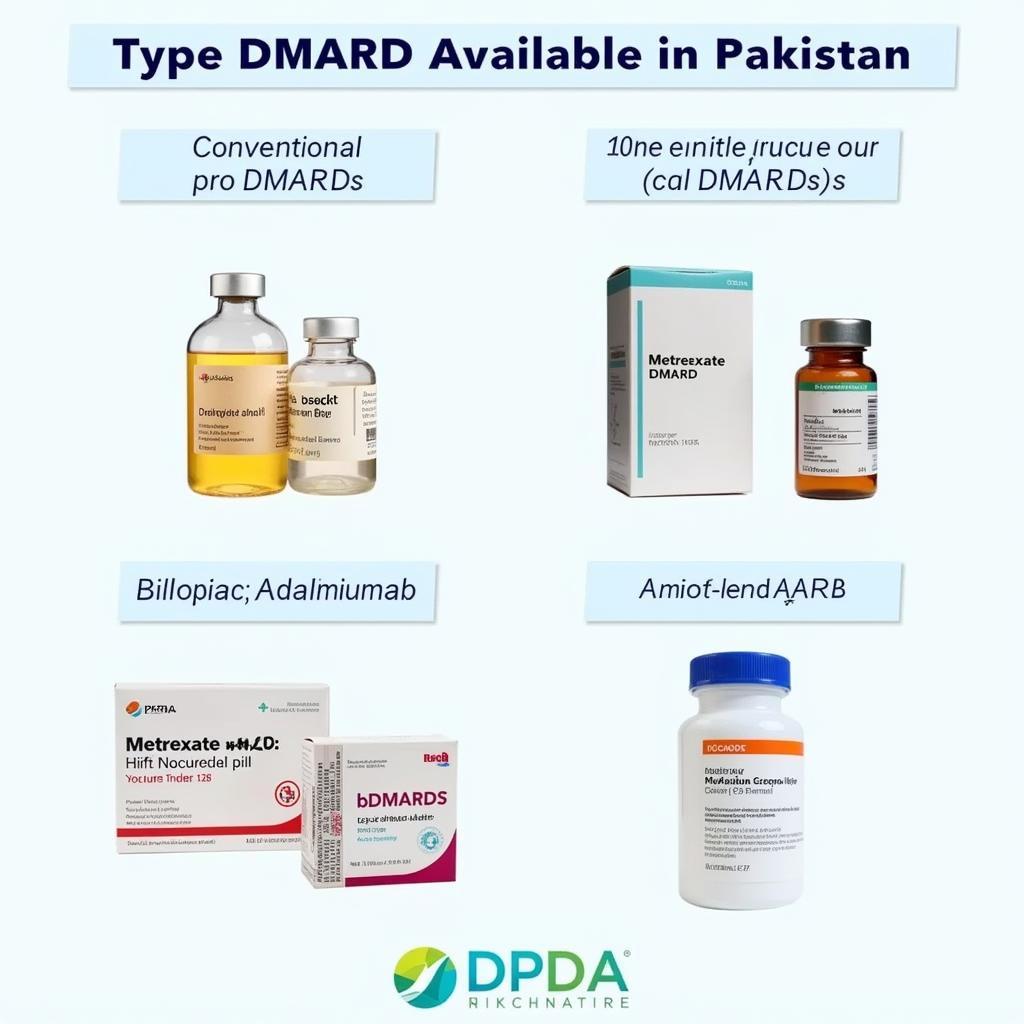DMARDs, or Disease-Modifying Antirheumatic Drugs, are crucial for managing rheumatic diseases in Pakistan. These medications work by slowing or stopping the progression of these conditions, offering relief and improving the quality of life for countless individuals. This article explores the landscape of DMARDs in Pakistan, delving into their types, usage, accessibility, and impact on patients’ lives.
What are DMARDs and Their Significance in Pakistan?
DMARDs represent a cornerstone of rheumatic disease management. Unlike pain relievers that simply mask symptoms, DMARDs target the underlying disease process, preventing further joint damage and disability. In a country like Pakistan, where rheumatic diseases can pose significant socio-economic challenges, access to and understanding of DMARDs are of paramount importance.
Types of DMARDs Available in Pakistan
Several types of DMARDs are available in Pakistan, categorized as conventional synthetic DMARDs (csDMARDs) and biologic DMARDs (bDMARDs). csDMARDs, such as methotrexate and sulfasalazine, have been used for many years and are generally the first line of treatment. bDMARDs, like adalimumab and etanercept, are newer and target specific molecules involved in the inflammatory process. The choice of DMARD depends on the specific rheumatic disease, its severity, and the patient’s individual characteristics.
 Types of DMARDs Available in Pakistan
Types of DMARDs Available in Pakistan
Accessing DMARDs: Challenges and Solutions
While the availability of DMARDs in Pakistan has improved, access remains a challenge, particularly for those in rural areas or with limited financial resources. The cost of bDMARDs can be prohibitive for many patients. However, initiatives by government and non-governmental organizations are working to improve access to these essential medications through subsidized programs and increased awareness campaigns.
How DMARDs Impact Patients’ Lives in Pakistan
DMARDs have a transformative impact on the lives of people with rheumatic diseases in Pakistan. By controlling disease activity, these medications reduce pain, stiffness, and fatigue, enabling individuals to participate more fully in daily activities, work, and family life. This not only improves their physical health but also their mental and emotional well-being.
What are the common side effects of DMARDs?
While generally effective, DMARDs can have side effects. Common side effects include nausea, hair loss, and increased risk of infections. Regular monitoring and close communication with a healthcare professional are essential to manage these side effects and ensure the safe and effective use of DMARDs.
 DMARDs Impacting Patients' Lives in Pakistan
DMARDs Impacting Patients' Lives in Pakistan
The Future of DMARDs in Pakistan
The future of DMARDs in Pakistan holds promise with ongoing research and development leading to newer and more targeted therapies. Increased awareness, improved access, and continued efforts to support patients are crucial for realizing the full potential of DMARDs in transforming the lives of those living with rheumatic diseases in Pakistan.
Are there any support groups for people using DMARDs in Pakistan?
Yes, several patient support groups and organizations exist in Pakistan to provide information, resources, and emotional support to individuals using DMARDs. Connecting with these groups can be invaluable for navigating the challenges and sharing experiences.
Conclusion
DMARDs play a vital role in managing rheumatic diseases in Pakistan. By understanding the different types, benefits, and challenges associated with these medications, individuals and healthcare professionals can work together to ensure optimal outcomes for patients and improve their quality of life. DMARDs offer hope and a path towards a healthier future for those affected by these debilitating conditions in Pakistan.
FAQ
- What is the cost of DMARDs in Pakistan?
- Are all DMARDs available through government health programs?
- How long does it take for DMARDs to start working?
- What are the long-term effects of using DMARDs?
- Can DMARDs be used during pregnancy?
- Are there any alternative treatments to DMARDs in Pakistan?
- Where can I find more information about DMARDs in Pakistan?
Common Scenarios and Questions
-
Scenario: A newly diagnosed patient is concerned about the cost of DMARDs.
-
Question: What financial assistance programs are available for DMARDs in Pakistan?
-
Scenario: A patient experiences side effects from their DMARD medication.
-
Question: Who should I contact if I experience side effects from my DMARDs?
Further Reading and Resources
For more information, you can explore other articles on our website related to rheumatic diseases, treatment options, and patient support resources.
Contact Us
For any assistance or inquiries, please contact us: Phone: +923337849799, Email: news.pakit@gmail.com, or visit us at Dera Ghazi Khan Rd, Rakhni, Barkhan, Balochistan, Pakistan. We have a 24/7 customer support team available to assist you.